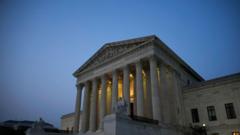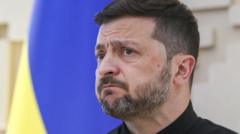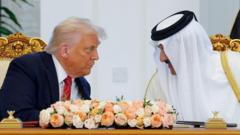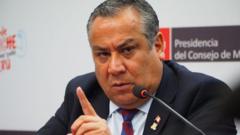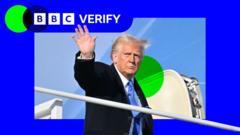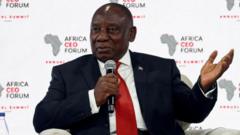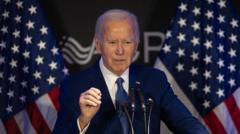With a fresh mandate following his election win, Trump vows to enact sweeping changes from day one of his second term. However, internal and external challenges loom as he faces the realities of governance and public expectations.
Trump Aims for Transformative Second Term as He Reassumes Office
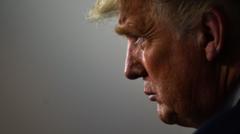
Trump Aims for Transformative Second Term as He Reassumes Office
As Donald Trump prepares for his second inauguration, questions abound regarding the seismic shifts he promises to bring to America.
As Donald Trump steps back into the Oval Office following his recent election victory, anticipation and skepticism are palpable in the air. On his inauguration day in the chilly heart of Washington DC, Trump looks to initiate an unprecedented period in American political history, marked by bold executive actions promised to reshape the nation's direction.
The swearing-in ceremony, held in the US Capitol's rotunda due to frigid weather, symbolizes a fresh start for Trump and the beginning of a period where he will be scrutinized more for actions than promises. During a fervent rally the day prior, Trump assured attendees that a slew of executive orders targeting issues such as immigration, environmental policy, and LGBTQ+ rights would be signed without delay. “Tomorrow will be quite the spectacle on your screens,” he declared to an energized crowd.
Nonetheless, despite the loud fanfare surrounding his return to power, significant questions linger about the nature of his second act. Will his ambitions result in monumental shifts within the American political landscape? Detractors fear potential authoritarianism, citing warnings from his predecessor Joe Biden regarding a coalition of influential billionaires poised to feed Trump’s political agenda, posing a threat to democracy.
No one can dispute that Trump's recent electoral success grants him a robust platform to enact his policies, having maintained control over the Republican Party, which rules both legislative chambers. He’s rallied his supporters with the prospect of aggressive reforms, backed by a dedicated team that aims to ensure immediate action on long-cherished initiatives. However, his success will hinge on navigating the complexities of legislation—and the opposition that may arise within Congress.
A significant focus for Trump is the elimination of what he describes as a “deep state” within the government. He is expected to implement sweeping personnel changes, removing numerous civil servants to install loyalists who will back his approach. Although some initiatives, particularly those requiring Congressional approval, may face hurdles, the chances of significant defiance from Republican legislators appear slim in light of Trump's stronghold over the party.
Challenges abound in executing his plans, particularly concerning controversial proposals for mass deportations of undocumented immigrants, which raise logistical and financial concerns. Democratic opposition exists, yet it seems less organized compared to the fervor observed during his initial term’s inauguration protests.
As Trump positions himself for a grand return, high-profile tech magnates such as Elon Musk, Jeff Bezos, and Mark Zuckerberg are set to attend his inauguration, a stark realization of the intertwined relationships between wealth and politics in contemporary America. These influential figures are already increasingly warming to Trump’s administration, signaling a complicated alliance.
Day-one executive orders are expected to captivate his base, including the potential for pardons for those involved in the Capitol riot. Yet, amid this populist spectacle lies a requirement for maintaining broad appeal, as certain segments of his policies may inadvertently betray the expectations of his supporters.
As Trump walks back into the spotlight, the populace anticipates a combination of showmanship and substantial change—a spectacle that will undeniably impact both American society and the global stage for years to come.








